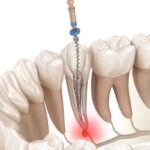Dental emergencies may come at the most inconvenient moments. A knocked-out tooth or an aching tooth that pops up suddenly may have you panicking. However, being swift is essential. Such situations are nerve-wracking, especially when you don’t know how to react. We know how overwhelming pain or panic at a dental emergency feels. But staying calm and knowing what to do can protect your teeth and prevent further damage
If you’re looking for an emergency dentist near you, this article will assist you. Find out what to do for most dental emergencies until you see a professional.
What to Do in a Dental Emergency
Knowing what to do in a dental emergency can make a huge difference in the outcome. Below are some general guidelines:
- Stay calm and evaluate the situation.
- Retrieve any fragments of broken or knocked-out teeth.
- Apply pressure using clean gauze if bleeding.
- Rinse your mouth with warm water.
- Use an ice compress to decrease swelling.
Always contact a dentist in Rutland for expert guidance, even if the issue appears insignificant.
Toothache Relief: Easy First Steps
Toothaches may be mild or severe. Until you visit a dentist, you may try:
- Rinsing your mouth with warm salt water
- Gently flossing away food or debris
- Taking over-the-counter pain medication such as ibuprofen
- Placing a cold compress on the outside of your cheek
Never apply aspirin to your gums, as it can burn. If the pain persists or becomes worse, dental emergency treatment might be needed. Contact an emergency dentist in Rutland for assessment.
Chipped Tooth: Protecting the Damaged Area
A chipped tooth may not always hurt, but it can expose sensitive layers of the tooth or lead to further damage. Here’s what to do:
- Rinse your mouth with warm water
- Save any pieces if possible
- Cover sharp edges with dental wax or sugarless gum
- Avoid chewing on that side of your mouth
Visit a dentist in Rutland soon so that long-term problems do not arise. A cracked tooth can usually be fixed with veneers, crowns, or dental bonding.
Knocked Out Tooth: Act Fast
If you have a knocked-out tooth, you need to act within 30 minutes for the best chance of saving it:
- Pick up the tooth by the crown (not the root)
- Rinse it gently if dirty, but do not scrub
- Try to place it back in the socket if possible
- If not, keep it moist in milk or saline
- Go to an emergency dentist near you immediately
Time is critical. A knocked-out tooth can sometimes be re-implanted if handled correctly.
Common At-Home Tools for Managing Dental Emergencies
| Tool | Use in Emergency | Precaution |
|---|---|---|
| Cold Compress | Reduces swelling from injuries or toothaches | Apply in intervals (15 minutes on, 15 off) |
| Clean Gauze or Cotton Pad | Controls bleeding from oral cuts or lost teeth | Avoid removing too soon—apply steady pressure |
| Salt Water Rinse | Cleans minor wounds and soothes irritation | Use warm water; don’t swallow |
| Temporary Filling Material | Covers chipped or lost fillings temporarily | Only a short-term fix—see a dentist ASAP |
| Dental Floss | Removes lodged food causing pain or swelling | Be gentle to avoid gum injury |
| Pain Reliever (Non-aspirin) | Manages pain while waiting for care | Follow dosage instructions carefully |
Dental Emergency Care: When to Seek Help
You should always seek dental emergency care if:
- You have uncontrolled bleeding in the mouth
- There is a visible abscess or pus
- You have a loose or broken filling
- A crown has fallen out
- You’re experiencing swelling or fever
Delaying care may increase pain, cause infections, or lead to permanent damage. Even small issues can become serious without proper attention.
Preventing Future Emergencies
You can reduce the risk of emergencies by following a few smart practices:
- Wear a mouthguard during sports
- Avoid chewing ice or hard candy, or opening items with your teeth
- Maintain regular dental checkups
- Brush and floss daily to keep gums and teeth healthy
Establishing good habits helps prevent accidents and keeps your mouth strong.
Preventive Dental Care Tips for Seniors
Seniors face unique challenges when it comes to oral health. Some helpful tips include:
- Stay hydrated to prevent dry mouth
- Use fluoride toothpaste to strengthen enamel
- Clean dentures daily
- Schedule regular cleanings and exams
Look for changes in your mouth, such as sores or sensitivity
Following these preventive dental care tips for seniors can help detect issues early and maintain comfort and function.
When Do You Need a Dentist?
In emergencies, time matters. Whether it’s a chipped tooth, a persistent toothache, or a knocked-out tooth, knowing where to go is just as important as knowing what to do. A trusted dentist in Rutland can help manage pain and protect your long-term health.
If you don’t already have a go-to dental provider, consider searching for one that offers same-day appointments and emergency services.
Wrapping Up!
Dental emergencies can be scary, but knowing how to respond gives you control. Quick action, calm thinking, and professional care make all the difference.
Prompt Care Saves Teeth and Smiles
If you ever find yourself in a dental emergency, don’t wait. Contact or visit Acorn Dental & Implant Center to get help when you need it most. Our team is here to support your oral health with expert and compassionate care.







